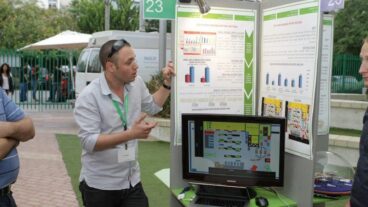Anecdotal evidence shows that some of the patients participating in the study are experiencing improvement in their condition and their ability to function.A revolutionary Israeli genetic treatment could bring new hope to patients suffering with severe coronary heart disease.
The procedure, which involves implanting a gene that causes new blood vessels to grow in the damaged section of the heart, is showing promise in experimental trials at the Rabin Medical Center in Petah Tikva.
According to the American Heart Association, some seven million Americans suffer from coronary heart disease, which is caused by a narrowing of the coronary arteries that feed the heart. The condition is the biggest killer of both men and women in the US, with more than 500,000 Americans each year dying of heart attacks caused by some form of the disease.
A year ago, a 69-year-old Israeli patient named Amos Ben-Yosef was the first person to undergo the procedure, which is being supervised by the Rabin Center’s Prof. Ron Kornovsky.
Ben-Yosef had previously undergone two heart bypass surgeries and a number of angioplasties, and the medication generally prescribed for heart conditions was no longer effective on him. The smallest daily effort caused him severe chest pain, and his quality of life was extremely low.
He therefore volunteered to have his heart injected with a gene that encourages the growth of new blood vessels. Following the procedure, his condition improved and he was eventually released and continues to recover at home.
“While there have been some genetic trials involving the naked DNA, this is the first procedure I am aware of that attempts to apply gene therapy to repair the heart,” Kornovsky told ISRAEL21c. “And so far, we are encouraged by the progress of the research.”
In the year-long study that is currently underway, additional heart patients have had their hearts injected with the gene in a double-blind study. In addition to the Israeli patients, the procedure is also being conducted in Denmark and Germany as a Phase II study to examine its safety and efficacy. Two-thirds of all of the patients are having the gene implant and one-third are receiving a placebo.
While the study is still in progress and therefore there are no definitive results, anecdotal evidence shows that some of the patients participating in the study are experiencing improvement in their condition and their ability to function.
Like any muscle, the heart needs a constant supply of oxygen and nutrients that are carried to it by the blood in the coronary arteries. When the coronary arteries become narrowed or clogged and cannot supply enough blood to the heart, the result is heart disease. If not enough oxygen-carrying blood reaches the heart, the heart may respond with pain called angina. The pain is usually felt in the chest or sometimes in the left arm and shoulder. When the blood supply is cut off completely, the result is a heart attack. The part of the heart that does not receive oxygen begins to die, and some of the heart muscle may be permanently damaged.
A significant percentage of patients who have suffered from heart conditions for a long time, reach a point, like Ben-Yosef, where they no longer respond to conventional treatment, and may not be candidates for a transplant. They generally suffer from chest pains from the smallest efforts, because their heart is incapable of pumping enough blood to support that activity, and simple tasks, even within their homes, can upset their heart rhythm and endanger their lives.
The Rabin Center pioneering technology begins when the doctors take a gene that is created in the laboratory designed to encourage blood vessel growth. That gene is implanted into a virus. Once the virus has the gene inside it, it is injected into the patient’s heart in 12 different locations, targeting points where the blood supply is the weakest, and the most blood vessels are blocked.
The purpose of the procedure is to help the patients’ heart grow new blood vessels to carry blood from the healthy parts of the heart to the impaired locations. In order to prevent uncontrolled blood vessel growth that could cause damage, the gene is programmed to wither away and disappear after a certain amount of time.
The gene that is being used in the procedure is called BioBypass, and is manufactured by GenVec, a biotechnology company in Gaithersburg, Maryland. The catheters that are being used are produced by Johnson and Johnson.
While Kornovsky is cautious to represent the current information as a “progress report” – it was published with the goal of recruiting additional patients to the study – the research team is encouraged by the anecdotal evidence of some of the participants, whose ability to function has improved, in some cases significantly.
“We don’t want to misrepresent this as a magic cure: the research is still underway and we need to keep following the patients until the ‘blinders’ are lifted before we can reach definite conclusions as to how effective the treatment is,” he said.
“But our significant achievement at this point is the fact that we have demonstrated that this course of therapy is safe – none of the patients who underwent the procedure have suffered any adverse effects.”












